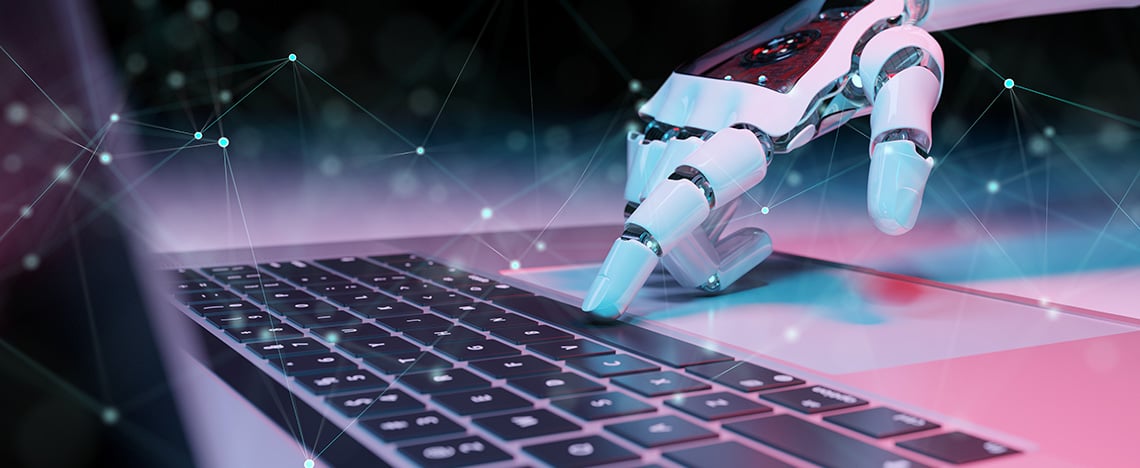
AI Can't Replace Marketers, But It Can Do This

After ChatGPT launched last November, I put a temporary moratorium on reading about artificial intelligence and machine learning (AI/ML). I needed at least a few days of blissful ignorance before facing the impending death of my writing career head-on.
But I couldn’t escape it. Within one week, the platform amassed one million users and sent marketing and engineering teams into a panic. Professionals watched in fascination and dread as the free ML tool spit out useful code in numerous programming languages and eerily conversational content. By the end of January, ChatGPT surpassed 100 million users.
Was this the moment decades of sci-fi movies warned us about?
Once I stopped catastrophizing and started digging in deeper, I realized that, although this was undoubtedly a turning point in the development of AI/ML, my job was still safe. In fact, if we harness its power correctly, this new generation of tech is poised to make marketing easier and yield massive returns for organizations of all sizes.
Here’s how embracing machine learning in marketing and AI in marketing today will help your company thrive well into the future (and why you still need human marketers to help you get there):
Why AI/ML Isn’t Replacing Human Marketers (Yet)
AI/ML technology is astounding. It has completely altered how we live and work, powering things like facial recognition software, digital voice assistants, navigation apps and other tech ingrained in our daily experiences.
In marketing, AI/ML parses massive data sets, enabling programmatic advertising and personalization at scale, and helping us produce content more efficiently and effectively. But while it’s come a long way over the past decade, it’s still far from perfect.
First, there’s the issue that ML-generated content is often problematic. For example, ChatGPT users caught the tool inserting gibberish into codebases, fabricating answers, plagiarizing human work and writing articles filled with factual and or outdated errors. It also occasionally delivers content that’s racist, sexist, X-rated or just downright bizarre. In short, publishing AI/ML-generated content without running it past human fact-checkers, brand writers, editors and subject matter experts could land your company in hot water.
"AI has biases deeply embedded within its models that people are working on,” says Samyutha Reddy, Head of Enterprise Marketing at generative AI/ML platform Jasper. “AI has the tendency to hallucinate and start talking about random things when you're asking it for outputs, so it would be really tough to just completely remove a human from the process."
Additionally, according to decades of neuroscience research, emotions guide the majority of our decision-making process — including B2B purchasing decisions. We tend to buy from brands we feel connected to and people we like and trust. And while AI/ML can mimic human expressions and empathy, it’s incapable of genuinely connecting over lived experiences. Humans evoke the deep emotional responses that earn trust, foster relationships and compel people to buy.
How AI/ML Can Strengthen Your Marketing Outcomes
Most of us are at least a little uneasy about artificial intelligence. According to Pew Research, only 15% of Americans are more excited than concerned about the rise in AI use. But, while it’s easy to focus on hypotheticals and reject AI/ML out of fear, it’s much wiser to learn how to use this technology to your advantage. After all, it’s not going anywhere, and refusing to adopt this powerful tech could leave you behind your competition.
Here are three ways marketers and business leaders can use ML and AI in marketing to make their jobs easier — and increase revenue-generating potential:
Transform data into actionable insights
Businesses have amassed a dizzying amount of data over the past couple of decades. Today, most organizations have more data than they could ever hope to analyze, understand, or apply — at least, without help from AI/ML.
“This is precisely the type of challenge that artificial intelligence is built to overcome,” says Grant McDougall, CEO of AI brand strategy platform BlueOcean. “Intelligent algorithms grow smarter the more data they ingest, which increases the value they provide to users by distilling mounds of data into grokkable insights.”
AI/ML can process vast amounts of raw data in seconds, rapidly translating that information into actionable insights, customer profiles and predictive analytics.
Create personalized experiences
Buyers expect tailored experiences. But, without the right tech, it’s nearly impossible to deploy true personalization at scale. Today, thanks to ML and AI in marketing, personalization tokens and smart content make it easy to deliver convenient and meaningful customer experiences across websites, ad copy and chat.
In the past, only enormous brands like Amazon, YouTube, Netflix or Spotify could leverage the power of recommendation engines. But as AI/ML tools become more accessible and marketers better understand how to use these solutions, advanced personalization (or hyper-personalization) will become possible for brands of any size.
For example, marketing automation platforms like HubSpot leverage AI/ML to power personalized email workflows, improve lead scoring, and allow marketing teams to develop their own bespoke ML frameworks.
Free up humans for creative and strategic thinking
One of the best ways AI/ML can help is by taking over tedious, routine tasks so humans can focus on the work we do best: applying our creativity, coming up with big-picture strategies and cultivating meaningful relationships. For example, AI/ML tools can book meetings on your behalf, score leads in real-time, conduct and compile research, create outlines or help optimize content assets for better conversion. And, in a time of talent shortages and rising business costs, offloading these tasks to make the most use of your teams’ time can be a tremendous competitive advantage.
As AI/ML technology grows more powerful, it’s vital you use these tools and solutions wisely. While it’s highly unlikely AI/ML will replace marketing teams (at least not anytime soon), it can help eliminate headaches and barriers to success while making work easier and more rewarding for everyone involved. And by learning to harness the potential of ML and AI in marketing today, you can gain an edge over your competition.




